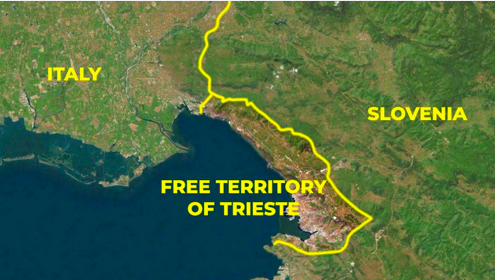Port of Trieste: the I. P. R. F. T. T. joins the EU procedure regarding the taxation of Italian Ports

The International Provisional Representative of the Free Territory of Trieste – I.P.R. F.T.T. has submit an official intervention in the European Commission’s procedure State aid SA.38399 (2018/E) Corporate Taxation of Ports in Italy. The intervention of the I.P.R. F.T.T., lodged on 8 February under protocol number 2020/01608, revolves on the international Free Port and the customs port of Trieste, and is now published both in the original English version (LINK) and with an Italian translation (LINK).
The EU procedure considers that Italy is not levying the corporate income tax on its Port System Authorities, which administer Italian ports, and it does also include the Italian Port Authority of Trieste and Monfalcone among them. In November 2019, the Commission concluded its consultations with the Italian Government, and, considering the answers provided by Italian authorities ungrounded, on 10 January it opened that official investigation, inviting the Italian Government and all third parties interested to submit their observations within one month.
The intervention of the I.P.R. F.T.T. considers that the international Free Port and the customs port of Trieste are not ports of the Italian State, but ports of the present-day Free Territory of Trieste, established with the 1947 Treaty of Peace and sub-entrusted, since 1954, to the temporary civil administration of the Italian Government by the Governments of the United States, in their role of primary administering Governments, and of the United Kingdom on behalf of the UN Security Council.
As further evidence of the legal force, in 2020, of the pertinent provisions of the 1947 Treaty of Peace and of its executive instruments, the I.P.R. F.T.T. lodged a detailed legal expertise (LINK) and it has recalled, in particular, laws in force of the Italian State (Decree of the Provisional Head of State No. 1430/47, Italian Law. 3054/52, Decree of the President of the Italian Republic 27 October 1954, Italian Constitutional Law No. 1/1963 artt. 1, 2, 4, 70) and documentation of the U.S. Department of State (Treaties in Force, A List of Treaties and Other International Agreements of the United States in Force on January 1, 2019).
Also, the I.P.R. F.T.T. considers that the jurisdiction of the EU does not regard international agreements concluded before 1958, but it covers the fact that they make it impossible regarding and taxing the international Free Port and the customs port of Trieste as if they were Italian or EU ports without giving raise to breaches of arts. 3(5), 5(2), 21(1), 52(2) of the Treaty on the European Union and of arts. 351 and 355(3) of the TFEU.
This side aspect of the legal status of Trieste does therefore make it possible bringing it before the European Commission and before the EU Court of Justice, while continuing the lawsuits with which the I.P.R. F.T.T. has already summoned before Court the Italian Government both on taxation (Lawsuits No. 1757/17, now No. 139/19 App., and lawsuit No. 4277/18), and on the management of the international Free Port and on agreements with the People’s Republic of China (Lawsuit No. 5209/19).
Finally, in its intervention, the I.P.R. F.T.T. notes that the sub-administering Italian Government has never taken care to negotiate agreements between the administered Free Territory and the European Union.
Author of the English version: Silvia Verdoljak.
© 12 Febbraio 2020














